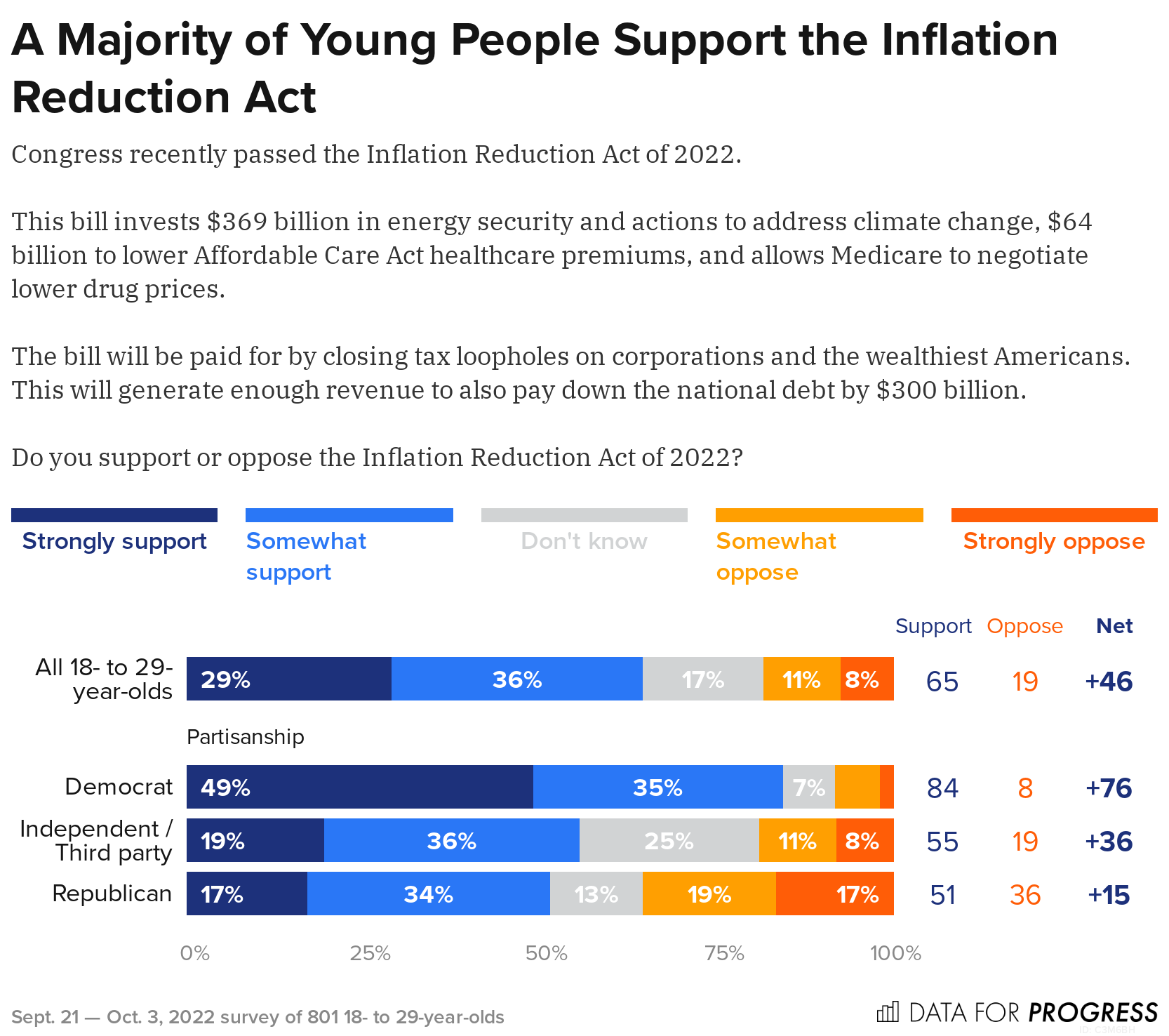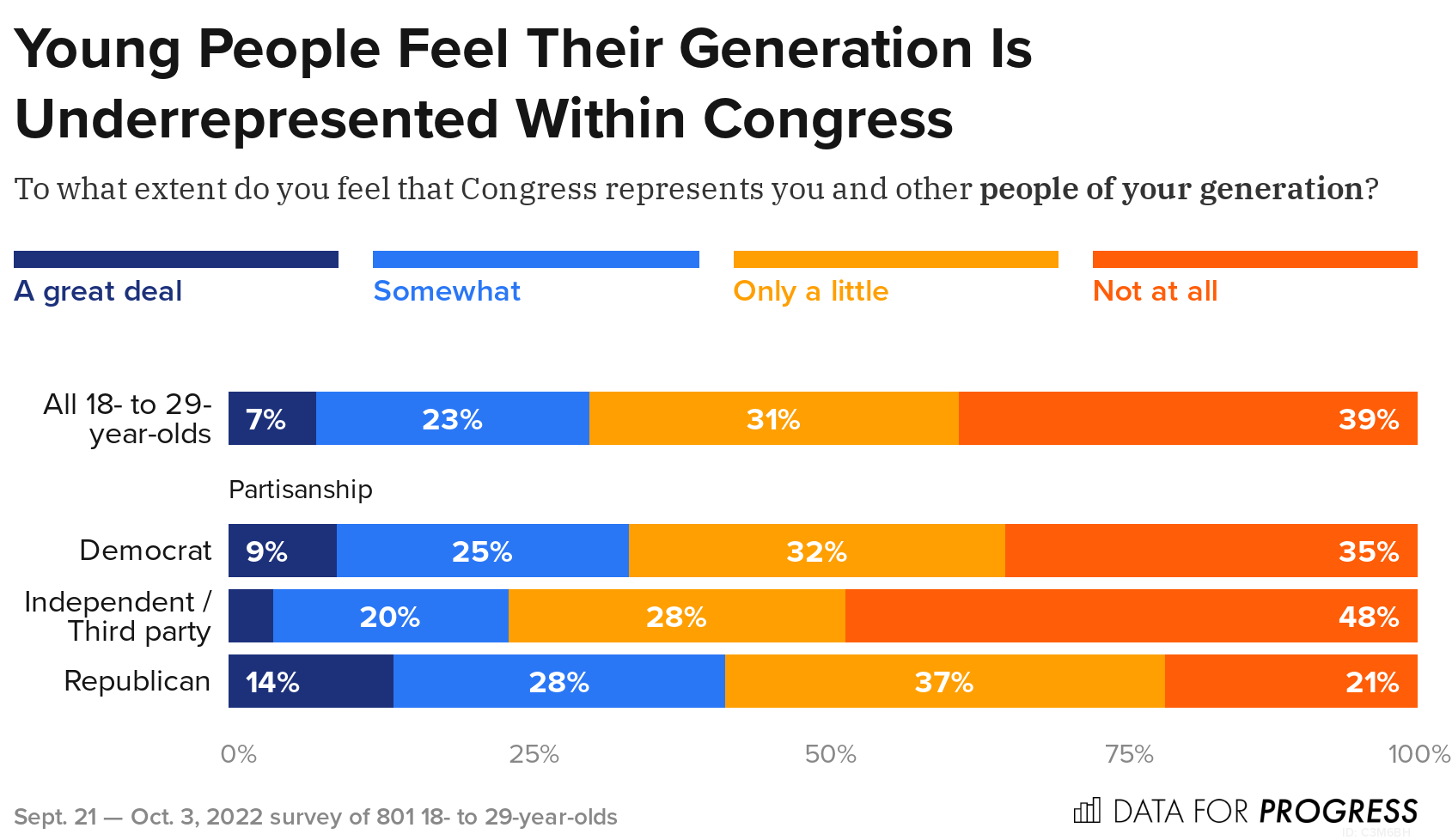No Generation Without Representation: A Survey of Young Americans
By Grace Adcox
A recent poll by Data for Progress indicates a majority (70 percent) of America’s 18- to 29-year-olds feel their generation is underrepresented in Congress. While young Americans broadly support recent congressional and executive actions by their elected representatives, including the passage of the Inflation Reduction Act of 2022 (65 percent) and the elimination of $10,000 in federal student loan debt (65 percent), more than half of young people (53 percent) still believe that their vote matters “only a little” or “not at all.”
Data for Progress fields national surveys of young Americans to dive deeper into the voting decisions, political attitudes, and policy preferences of America’s future leaders. With Maxwell Frost (D-Florida) positioned to break barriers this midterm election as the first Generation Z member of Congress, this is an opportune moment to consider how young Americans view and participate in their political system, as well as how they engage with pressing issues on the electoral stage. This survey, conducted between September 21 and October 3, asked 801 Americans ages 18-29 about their attitudes on climate change, abortion, the economy, the political establishment, and other key issues.
We identify several central findings from the survey, including:
1. Young Americans broadly support policies passed under the Biden Administration that make progress on issues they consider important, including climate change, the economy, and student debt.
A majority of young people (65 percent) support the Inflation Reduction Act, led by Democratic Senators Chuck Schumer and Joe Manchin, which makes key investments in the climate and in the economy. Inflation comes top of mind for young people, with 34 percent of respondents stating it should be a top issue for congressional candidates to focus on, while 21 percent of young people identify climate change and the environment as a top issue.
With student debt impacting nearly half of young Americans, President Biden’s $10,000 in federal student loan forgiveness and additional $10,000 in debt relief for Pell Grant recipients enjoys support from 65 percent of respondents, including 86 percent of Democrats, 58 percent of Independents, and 44 percent of Republicans.
2. When it comes to the issues young Americans care most about, these individuals generally trust the Democratic Party to deliver on these issues more than they trust the Republican Party.
Young people consider abortion to be one of the most important issues for a candidate for Congress to focus on, with 33 percent of respondents listing abortion as a top concern. Nearly half of young people (48 percent) say that the Dobbs decision is one of the top two issues motivating their vote. Meanwhile, 49 percent of respondents trust Democrats to handle abortion and women’s reproductive rights issues — a 30-point gap over the Republican Party.
Already, young Americans are observing the realities of a changing climate. Seventy-three percent of those polled say that they are concerned about the impact of climate change on their communities, while 47 percent say they trust the Democratic Party to respond to the crisis. Only 15 percent prefer that the Republican Party handles climate issues.
Additionally, 64 percent of young Americans indicate they are “very concerned” or “somewhat concerned” about America’s student debt crisis. When it comes to identifying which party can resolve these concerns, 43 percent of young people trust Democrats to handle the cost of education and student loan debt, while 22 percent trust Republicans.
3. On issues related to the economy and the job market, young people have greater faith in Republicans than in Democrats to deliver effective policy, but are split in confidence over which party can better address the cost of living.
Economic pressures have dominated the lives of young Americans. Both millennials and Gen Z are familiar with economic pressures stemming from an unstable job market and a rising cost of living, especially during the coronavirus pandemic. These young adults identify economic issues as centrally important to address, with 31 percent indicating candidates for Congress should focus on jobs and the economy, while 34 percent believe the focus should be on inflation.
However, 18- to 29-year-old Americans identify the Republican Party as more trustworthy on handling job creation and the economy in general than the Democratic Party, with 37 percent of respondents indicating they trust the Republican Party more, compared to 27 percent choosing the Democratic Party.
Notably, when it comes to the cost of living, young Americans are more equally divided as to which party they trust more. Thirty-one percent trust Republicans more to handle the cost of living, while 30 percent trust Democrats more. This may speak to the broader effects of the Inflation Reduction Act and Democratic messaging about lowering the cost of living, including lowering the cost of healthcare and curbing the rising prices of goods and services by reducing inflation.
4. Young Americans want to see bold policy action taken on their top issues and report greater motivation to vote because of these issues — including codifying abortion rights, curbing gun violence, and addressing climate change.
For many young people, the Supreme Court’s decision to overturn Roe signifies that they will grow up with fewer rights than their parents and grandparents enjoyed. A plurality (40 percent) of those polled say that the next generation will have fewer rights than the current generation, including a higher percentage of female respondents than male respondents. Protecting abortion access matters to a majority of young Americans, with 67 percent of respondents indicating abortion should be legal under most circumstances.
Millennials and Gen Z are also the first to grow up in an age of mass shootings and violence at schools. Gun violence ranks as one of the key issues for these Americans, with a quarter of young people naming it as one of the top two issues motivating their vote in November. Also, 23 percent of young people indicate that gun control is among the most important issues for a congressional candidate to address.
While climate change is already affecting communities across the nation, the Inflation Reduction Act represents the first major piece of climate legislation in many young people’s lifetimes. A majority (53 percent) of young Americans say that the U.S. has not done enough to address climate change and needs to take drastic action to protect future generations. Only 9 percent say the U.S. does not need to take any climate action at all.
From the Sunrise Movement to March for Our Lives, young people are already leading movements to push for progressive change. By a +48-point margin, young Americans across party lines support the use of protests to advance causes that they support. Young people want bold policy action to address the issues facing their generation — and they’re willing to make their voices heard to get there.
5. As young people look at their elected representatives and the American democratic system, they feel that their interests, perspectives, and generation are underrepresented in politics.
Although young Americans support some of the policies taken on by their elected representatives in the last year, many still feel deeply underrepresented in their political system. Only 30 percent of 18- to 29-year-olds surveyed say they feel that Congress represents themselves and other people of their generation “a great deal” or “somewhat,” as compared to 70 percent who believe they are represented “only a little” or “not at all.”
This feeling of underrepresentation extends to how young Americans think about voting and participation in the political system. A slim majority (53 percent) of young people believe their vote matters in elections “only a little” or “not at all,” which aligns with observed lower levels of youth turnout and participation in elections.
Young Americans also want to see reforms to the political system, with two presidential elections in the last 25 years won by a candidate who did not win the popular vote. By a +28-point margin, young people support ensuring that the presidential candidate who receives the most overall votes wins the election, even if they do not win a majority of Electoral College votes.
Despite feeling underrepresented by their political system, young Americans will play a vital role in determining the outcome of the midterm elections this fall. Crucial issues in these elections, including abortion and reproductive rights, climate change, and the economy, are deeply important to young people in America. The midterms offer an essential opportunity to successfully mobilize youth voters and help reengage young Americans with their political system by developing policies and messaging to address the issues that matter most to America’s future leaders.
Grace Adcox (@GraceAdcox) is a polling analyst at Data for Progress.





